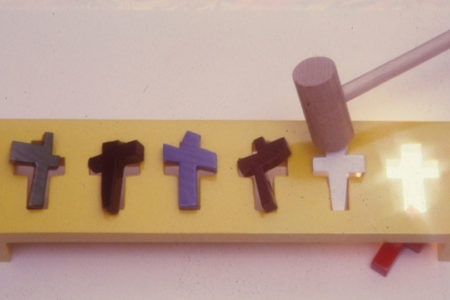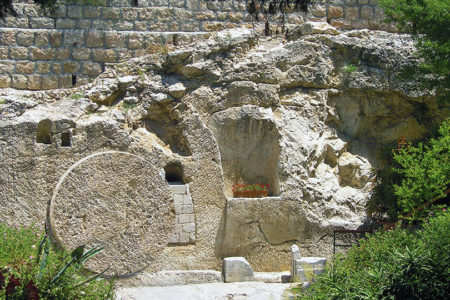Israel: A Dying Dynasty Amos 8
In winter it is trendy to give friends a large basket of fresh fruit wrapped in cellophane and tied at the top with a red bow. The fruit is beautiful to behold, but left in a warm room it quickly discolors as decay sets in. What was once so beautiful to the sight, succulent to the taste, and fragrant to the smell becomes repugnant and must be discarded. In like fashion, God portrayed the final days of Israel’s great dynasty.
Israel’s Destiny
Amos was given a fourth vision wherein the Lord revealed Israel’s demise, comparing it to a “basket of summer fruit” (vv. 1–2). “Summer fruit” is a crop that has fully ripened, is ready for harvest, and signals the end of the growing season in Israel. In like manner, Israel was fully ripe for God’s judgment.
There is a play on the words “summer fruit” (Heb., qayis) and “end” (v. 2) [Heb., qes] or end time for cutting. As the summer fruit had reached its time for plucking, so Israel had reached her time to be cut down in judgment.
A polluted Israel had become ripe for judgment. Privileges that God had bestowed on the nation were misused. Passionate invitations to repent had gone unheeded. Present warnings from the prophet concerning coming judgment had been ignored. Past mercies shown to Israel would cease; God would “not again pass by them” (v. 2) in a show of mercy.
Although harvest time is a joyful occasion for most people, it would not be so for Israel. Their joyful songs of the Temple would be changed to wailing (v. 3) as they grieved over their national destruction. A harvest of dead bodies would be gathered in every place (v. 3; cp. 5:3) for burial. Those delegated to bury the dead would be so overcome by the carnage that they would carry out their task in utter silence (v. 3).
This picture is reminiscent of the Jewish Holocaust during World War II. Who has not seen pictures of Jewish men in tattered clothing, limping along in stunned silence as they pushed rickety carts piled high with corpses toward a common grave? Those seeing such scenes for the first time are usually stunned into silence.
Israel’s Deeds
Amos went on to describe the sins that made Israel ripe for judgment. First, dishonest businessmen had “swallow[ed] up the needy, even to make the poor of the land to fail” (v. 4). The words “swallow up” are better translated to pant after (cp. 2:6–7), picturing the eagerness of the business leaders to devour the poor like a wild beast would devour its prey. These greedy profiteers targeted poverty-stricken, defenseless people, seeking to confiscate their meager holdings through harassment and intimidation. They would “buy the poor for silver, and the needy for a pair of shoes” (v. 6), meaning that those who were unable to pay their debts were sold into slavery for a little silver or the price of a pair of sandals.
Israel’s business community was so greedy for wealth that they chafed under the law that required business to cease for the monthly observances of the new moon and the weekly sabbath (v. 5). Most likely they spent their time not in worship but in planning and scheming new ways to accumulate greater profits when the markets reopened.
Second, they used deceptive weights and measures in business, making “the ephah small, and the shekel great, and falsifying the balances by deceit” (v. 5). The ephah (bushel) used in measuring grain was made smaller in size, cheating the people out of grain. The shekel used in weighing money for purchase was made heavier, overcharging the people. The balances (scales) were falsified; people did not receive the amount of grain they paid for. Such practices were highly condemned.
Third, they deprived people of the basic sustenance for good nutrition. They sold the poor the “refuse of the wheat” (v. 6), a product that was of no value, was unfit for human consumption, and was usually thrown out or given to the poor. But these profiteers mixed this material into the packages of grain they sold. Dr. Laetsch points out, “Their insatiable lust for gold impelled them to resort to shamefully fraudulent tricks. Even the barest necessities of life, wheat and corn, grain in general, were to them welcome means of squeezing profits out of the needy brethren.”*
Such attitudes are prevalent in business today. Blue laws, instituted to prohibit Sunday shopping have vanished in most communities. Sunday has become the most lucrative day of the week for most businesses in this country. The nation is replete with business scams run by unscrupulous people who prey upon the elderly and undiscerning to fleece them of their money.
Israel’s Dark Days
Such human injustice perpetrated on the poor could not go unpunished; God’s heavenly judgment was about to be pronounced on Israel’s leaders. Amos announced, “The Lᴏʀᴅ hath sworn … Surely I will never forget any of their works” (v. 7). The Lord swore that He would never forget the extreme wickedness done to the poor in Israel.
What did the prophet mean when he said, “The Lᴏʀᴅ hath sworn by the excellency of Jacob” (v. 7)? Two interpretations are possible. Some believe the Lord has sworn against the “excellency [pride] of Jacob” that is, against the arrogant way in which Israel treated the poor and put her trust in wealth. Others believe that the “excellency [pride] of Jacob” refers to God Himself, who is the pride and glory of Israel. Thus, God swore by Himself that He would not forget the evil works that Israel had done against her poor (v. 7). Most commentators hold the latter position.
Amos used three metaphoric statements from nature to describe the severity of God’s judgment on Israel First, it would be like an earthquake that causes the whole land to tremble (v. 8), striking terror in the people. Second, foreign armies would sweep across the land spreading destruction like “the river of Egypt” (the Nile) (v. 8) when it floods, rising and receding, spewing up mire and debris everywhere. Third, God would “cause the sun to go down at noon, and … darken the earth in the clear day” (v. 9). Possibly Amos had a literal solar eclipse in mind, for two had taken place in his day (784 B.C. and 763 B.C.). More likely he was picturing the land of Israel shrouded with the black mantle of God’s judgment.*
This is a clear picture of the Assyrian army invading the land of Israel. The land would tremble under the horses’ hooves as the army flooded into Israel, spreading death and destruction throughout the nation, bringing a dark day in Jeroboam’s dynasty. The result of such devastation would cause everyone in the land to mourn (v. 8). Their joyful feasts would be turned into mourning (v. 10). Their joyful songs would be turned into lamentation (a funeral dirge) (v. 10). Their expensive clothing and beautiful coiffures would be turned into “sackcloth … and baldness” (v. 10), signs of deep mourning over sin. God would pierce them with the deepest grief possible, “the mourning for an only son” (v. 10) who had died. Such a loss meant that the family name would die out (Jer. 6:26; Zech. 12:10).
Most suffering and mourning soon cease or at least experience a time of relief, but not Israel’s grief. Their mourning would be like the “end of … a bitter day” (v. 10). It would not be a passing grief but an unending time of sorrow that would last as long as they lived. The image is that of an “undying death in hell!”*
Israel’s Doom
The Lord had sent His Word time and again (2:11–12; 3:1; 4:1; 5:1; 7:10–13, 16) to Israel, warning of coming judgment if she did not repent of her sin. But Israel had tried to stop the prophetic voice sent to her. She commanded the prophet, “Prophesy not” (2:12); “go … into … Judah … and prophesy there; But prophesy not again … at Bethel” (7:12–13). God’s Word and warning had been despised, ignored, rejected, trampled under foot, and gone unheeded by the nation.
Israel was granted her desire. God withdrew His Word so that she would hear it no longer. He sent “a famine in the land, not a famine of bread, nor a thirst for water, but of hearing the words of the Lᴏʀᴅ” (v. 11). He removed the prophetic voice from Israel.
Hunger to hear the Word of God would become so great that people would “wander [reel like a drunken man] … to and fro to seek the word of the Lᴏʀᴅ” (v. 12) throughout the land. Their search would take them “from sea to sea [the Mediterranean Sea to the Sea of Galilee], and from the north even to the east” (v. 12). Notice that they did not seek God’s Word in the south (Judea and Jerusalem) where it could be found. Their search was fruitless; God’s Word was hidden from them; they “shall not find it” (v. 12), said Amos.
Following Israel’s destruction in 722 B.C., the prophetic voice could be heard only in Judah. The prophets continued to speak even to the exiles of Judah and then to the remnant returning from the Babylonian captivity. Yet even in Judah there were long periods (690 to 650 B.C. and 492 to 437 B.C.) when no prophetic voice was heard in the land. Upon the completion of Malachi’s prophecy (420 B.C.), there was no written or spoken word from God until John the Baptist broke the silence over 400 years later.*
John’s message was one of preparation for the Messiah’s coming. Sadly, Israel’s religious and political leaders rejected his message. But the greatest rejection came when Israel refused to receive the Word of God from Jesus their Messiah. He came as spiritual bread (Jn. 6:51) and spiritual water (Jn. 7:37–39) to satisfy their need. After almost 2,000 years, the nation of Israel is still experiencing spiritual famine.
There is a spiritual famine not only among the Jewish people, but in many Gentile nations as well. For over 70 years those living under Communist rule have been deprived of God’s Word, but happily this is beginning to change. There are millions more in India and Moslem countries experiencing spiritual famine because their religious beliefs have kept the Bible from them.
Although the United States possesses more Bibles than any other country in the world, there is a growing famine when it comes to reading God’s Word. Carnal Christians, who feed upon self-indulgence, are finding that they have lost their taste for reading the Bible. Secularism, greed, and immorality have so inundated present-day America that most people have no appetite or tolerance for God’s Word.
God’s harsh judgment took its toll on “the fair virgins and young men” (v. 13) of Israel, those who were hearty and should have been able to endure hardship because of their youth. Even they would “faint for thirst” (v. 13)—physical thirst to be sure, but also spiritual thirst because they were unable to hear God’s Word (cp. v. 11). During those dark days the young people would feel helpless concerning the future. They would need a word from God to bring spiritual healing and hope for the future, but God was silent. If those in the full bloom of youth would faint under the calamity, what would happen to the babies and the elderly? Most assuredly, few would survive this day of doom and gloom.
The Pilgrims who settled America built the Ivy League colleges primarily to train young people in the Word of God with the purpose of evangelizing the Atlantic seaboard. Harvard’s early presidents believed that there could be no true knowledge without Jesus Christ. Harvard’s “Rules and Precepts,” adopted in 1646, stated, “Everyone shall consider the main end of his life and studies to know God and Jesus Christ which is eternal life. Every one shall so exercise himself in reading the Scriptures twice a day.” In the 17th century, 52 percent of Harvard’s graduates became ministers. These early educators understood that the moral climate of the schools would shape generations to come and ultimately decide the course of this nation.*
How different is the educational system in America today. God has been expelled from the schools of this country, and the state has replaced Him with a secular savior called humanism. The new savior has bankrupted this generation of young people, leaving them without the Word of God and, therefore, no moral compass for the future. Most churches and families are not much better at providing spiritual food for a starving generation of young people.
Israel was severely judged for her continual practice of idolatry. They “swear by the sin of Samaria, and say, Thy god, O Dan, liveth; and, The manner of Beersheba liveth” (v. 14). In other words, they reverenced and worshiped the golden calves at Bethel and Dan (Dt. 9:21; 1 Ki 12:28–30; 2 Ki. 10:29; Hos. 8:5–6), also making the 140-mile pilgrimage to commit idolatry at Beersheba. Amos made it clear that Israel’s idolatrous practices had sealed her doom: “they shall fall, and never rise up again” (v. 14).
Israel had been God’s vineyard. He had cultivated it, cleared out the stones, planted it with the choicest of vines built a tower to oversee its development, and had a wine press in readiness to process the beautiful harvest He expected to receive. But Israel produced wild grapes! Disheartened over the fruit, the Lord laid waste to His vineyard. He took away the hedge, broke down the fences, withheld rain and did not cultivate or prune it. In time it was eaten, and the residue was trampled under foot (Isa. 5:1–7). What a sad commentary on the people of God!
America, like Israel, was forged into a strong nation by the sovereign hand of Almighty God. No other nation in history has experienced such freedom, majesty, and blessing as America. But this fruitful nation is showing signs of spoilage. Sin has so discolored and decayed the moral fabric of this country that many see America as a dying democracy in the decade of the 90s. Let us take to heart God’s message to Israel and pray that the nation will rise up in revival before it falls, never to rise again.








